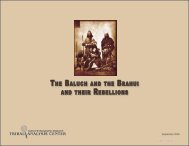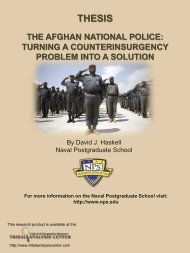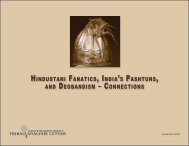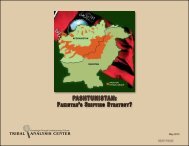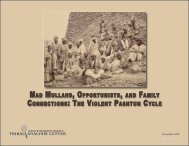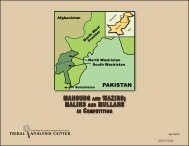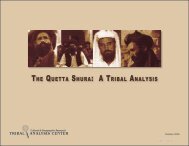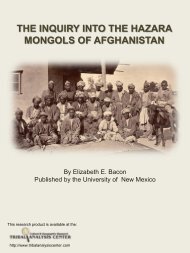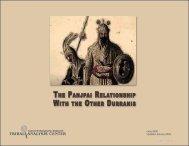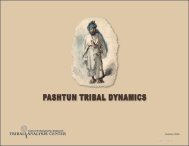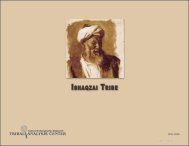- Page 1: THE OTHER SIDE OF THE MOUNTAIN: Muj
- Page 4 and 5: Chapter 3: Vignette Vignette Chapte
- Page 6 and 7: Chapter 14: Urban Combat 365 Vignet
- Page 8 and 9: FOREWORD When the Soviet Union inva
- Page 10 and 11: ACKNOWLEDGMENTS This book would not
- Page 12 and 13: PREFACE Afghanistan, a multi-ethnic
- Page 16 and 17: each other than trying to establish
- Page 18 and 19: through various Afghan political fa
- Page 20 and 21: Academy and Army Staff College. His
- Page 22 and 23: THE OTHER SIDE OF THE MOUNTAIN: Muj
- Page 24 and 25: Page 4 The Other Side of the Mounta
- Page 26 and 27: Page 6 The Other Side of the Mounta
- Page 28 and 29: Page 8 The Other Side of the Mounta
- Page 30 and 31: Page 10 The Other Side of the Mount
- Page 32 and 33: Page 12 The Other Side of the Mount
- Page 34 and 35: Page 14 The Other Side of the Mount
- Page 36 and 37: Page 16 The Other Side of the Mount
- Page 38 and 39: Page 18 The Other Side of the Mount
- Page 40 and 41: Page 20 The Other Side of the Mount
- Page 42 and 43: Page 22 The Other Side of the Mount
- Page 44 and 45: Page 24 The Other Side of the Mount
- Page 46 and 47: Page 26 The Other Side of the Mount
- Page 48 and 49: Page 28 The Other Side of the Mount
- Page 50 and 51: Page 30 The Other Side of the Mount
- Page 52 and 53: Page 32 The Other Side of the Mount
- Page 54 and 55: 194. 047. ▪ .•••" ElRAREZ S
- Page 56 and 57: 500 0 500 KM Del KHWAJA U N L AL L
- Page 58 and 59: Page 38 The Other Side of the Mount
- Page 60 and 61: Page 40 The Other Side of the Mount
- Page 62 and 63: —Er sa) CD CD -1=•• CD CD 0 C
- Page 64 and 65:
Page 44 The Other Side of the Mount
- Page 66 and 67:
Page 46 The Other Side of the Mount
- Page 68 and 69:
Page 48 The Other Side of the Mount
- Page 70 and 71:
Page 50 The Other Side of the Mount
- Page 72 and 73:
Page 52 The Other Side of the Mount
- Page 74 and 75:
Page 54 The Other Side of the Mount
- Page 76 and 77:
Page 56 The Other Side of the Mount
- Page 79 and 80:
VIGNETTE 15 AMBUSH AT QAFUS TANGAY
- Page 81 and 82:
Chapter 1, Vignette 1 Page 61 The p
- Page 83 and 84:
VIGNETTE 16 SISAY AMBUSH by Command
- Page 85 and 86:
Chapter 1, Vignette 16 Page 65 Ten
- Page 87 and 88:
Chapter 1, Vignette 16 Page 67 with
- Page 89 and 90:
Page 70 The Other Side of the Mount
- Page 91 and 92:
Page 72 The Other Side of the Mount
- Page 93 and 94:
Page 74 The Other Side of the Mount
- Page 95 and 96:
VIGNETTE 3 RAID ON BAGRAMI DISTRICT
- Page 97 and 98:
Page 78 The Other Side of the Mount
- Page 99 and 100:
-4— KABUL 12 K MILITARY ACADEM KA
- Page 101 and 102:
Page 82 The Other Side of the Mount
- Page 103 and 104:
Page 84 The Other Side of the Mount
- Page 105 and 106:
Page 86 The Other Side of the Mount
- Page 107 and 108:
Page 88 The Other Side of the Mount
- Page 109 and 110:
Page 90 The Other Side of the Mount
- Page 111 and 112:
Page 92 The Other Side of the Mount
- Page 113 and 114:
Page 94 The Other Side of the Mount
- Page 115 and 116:
Page 96 The Other Side of the Mount
- Page 117 and 118:
Page 98 The Other Side of the Mount
- Page 119 and 120:
Page 100 The Other Side of the Moun
- Page 121 and 122:
Page 102 The Other Side of the Moun
- Page 123 and 124:
CHAPTER 3 SHELLING ATTACKS Mujahide
- Page 125 and 126:
VIGNETTE 1 A SHELLING ATTACK TURNS
- Page 127 and 128:
Chapter 3, Vignette 1 Page 109 troo
- Page 129 and 130:
Chapter 3, Vignette 1 Page 111 COMM
- Page 131 and 132:
VIGNETTE 2 A NEW YEARS PRESENT FOR
- Page 133 and 134:
Chapter 3, Vignette 2 Page 115 befo
- Page 135 and 136:
Page 118 The Other Side of the Moun
- Page 137 and 138:
Page 120 The Other Side of the Moun
- Page 139 and 140:
Page 122 The Other Side of the Moun
- Page 141 and 142:
Page 124 The Other Side of the Moun
- Page 143 and 144:
Page 126 The Other Side of the Moun
- Page 145 and 146:
Page 128 The Other Side of the Moun
- Page 147 and 148:
Page 130 The Other Side of the Moun
- Page 149 and 150:
VIGNETTE 5 STORMING GULA'l by Haji
- Page 151 and 152:
Page 134 The Other Side of the Moun
- Page 153 and 154:
Page 136 The Other Side of the Moun
- Page 155 and 156:
CHAPTER 5 MINE WARFARE Mine warfare
- Page 157 and 158:
VIGNETTE 1 MUJAHIDEEN DEMOLITION ME
- Page 159 and 160:
VIGNETTE 2 MINING ATTACKS NEAR MEHT
- Page 161 and 162:
Chapter 5, Vignette 2 Page 145 set
- Page 163 and 164:
Page 148 The Other Side of the Moun
- Page 165 and 166:
Page 150 The Other Side of the Moun
- Page 167 and 168:
Page 152 The Other Side of the Moun
- Page 169 and 170:
Page 154 The Other Side of the Moun
- Page 171 and 172:
Page 156 The Other Side of the Moun
- Page 173 and 174:
Page 158 The Other Side of the Moun
- Page 175 and 176:
Page 160 The Other Side of the Moun
- Page 177 and 178:
Page 162 The Other Side of the Moun
- Page 179 and 180:
Page 164 The Other Side of the Moun
- Page 181 and 182:
Page 166 The Other Side of the Moun
- Page 183:
Page 168 The Other Side of the Moun
- Page 186 and 187:
Chapter 6, Vignette 5 Page 171 init
- Page 188 and 189:
Chapter 6, Vignette 5 Page 173 Some
- Page 190 and 191:
VIGNETTE 6 OPERATION GHASHEY (ARROW
- Page 192 and 193:
Chapter 6, Vignette 6 Page 177 B. N
- Page 194:
Chapter 6, Vignette 6 Page 179 Ther
- Page 197 and 198:
Page 182 The Other Side of the Moun
- Page 199 and 200:
Page 184 The Other Side of the Moun
- Page 201 and 202:
Page 186 The Other Side of the Moun
- Page 203 and 204:
GARDAY KAC - W \ \ SPINA TANA oA-Qc
- Page 205 and 206:
Page 190 The Other Side of the Moun
- Page 207 and 208:
COIVIMENTARY: The confident command
- Page 209 and 210:
Page 194 The Other Side of the Moun
- Page 211 and 212:
CHAPTER 7 SIEGE WARFARE The Mujahid
- Page 213 and 214:
VIGNETTE 1 FAILED SIEGE AT URGUN by
- Page 215 and 216:
Chapter 7, Vignette 1 Page 201 At 2
- Page 217 and 218:
Chapter 7, Vignette 1 Page 203 the
- Page 219 and 220:
VIGNETTE 2 DEHRAWUD OFFENSIVE In th
- Page 221 and 222:
Chapter 7, Vignette 2 Page 207 road
- Page 223 and 224:
Chapter 7, Vignette 2 Page 209 appr
- Page 225 and 226:
Page 212 The Other Side of the Moun
- Page 227 and 228:
Page 214 The Other Side of the Moun
- Page 229 and 230:
Page 216 The Other Side of the Moun
- Page 231 and 232:
Page 218 The Other Side of the Moun
- Page 233 and 234:
Page 220 The Other Side of the Moun
- Page 235 and 236:
Page 222 The Other Side of the Moun
- Page 237 and 238:
Page 224 The Other Side of the Moun
- Page 239 and 240:
CHAPTER 9 FIGHTING HELIBORNE INSERT
- Page 241 and 242:
VIGNETTE 1 SOVIET HELIBORNE RAID AC
- Page 243 and 244:
Chapter 9, Vignette 1 Page 231 retr
- Page 245 and 246:
VIGNETTE 2 SOVIET RAID ON KANDA by
- Page 247 and 248:
Page 236 The Other Side of the Moun
- Page 249 and 250:
Page 238 The Other Side of the Moun
- Page 251 and 252:
Mazer-e 1111 0 t Sharif Herat CHAPT
- Page 253 and 254:
VIGNETTE 1 BATTLE OF BARAKI BARAK b
- Page 255 and 256:
Chapter 10, Vignette 1 Page 245 ene
- Page 257 and 258:
VIGNETTE 2 DEFENDING AGAINST AN OFF
- Page 259 and 260:
Chapter 10, Vignette 2 Page 249 the
- Page 261 and 262:
VIGNETTE 3 BATTLE FOR KAMA by Abdul
- Page 263 and 264:
Chapter 10, Vignette 3 Page 253 Gha
- Page 265 and 266:
Chapter 10, Vignette 3 Page 255 rem
- Page 267 and 268:
VIGNETTE 4 DEFENDING AGAINST A CORD
- Page 269 and 270:
Chapter 10, Vignette 4 Page 259 The
- Page 271 and 272:
Chapter 10, Vignette 4 Page 261 can
- Page 273 and 274:
VIGNETTE 5 LAST STAND ON THE ISLAND
- Page 275 and 276:
Chapter 10, Vignette 5 Page 265 Naz
- Page 277 and 278:
CHAPTER 11 DEFENDING BASE CAMPS Alt
- Page 279 and 280:
VIGNETTE 1 SOVIET OFFENSIVE THROUGH
- Page 281 and 282:
Chapter 11, Vignette 1 Page 271 At
- Page 283 and 284:
VIGNETTE 2 DEFENDING SURKHAB BASE C
- Page 285 and 286:
Chapter 11, Vignette 2 Page 275 hig
- Page 287 and 288:
VIGNETTE 3 FALL OF SURKHAB BASE CAM
- Page 289 and 290:
Chapter 11, Vignette 3 Page 279 get
- Page 291 and 292:
VIGNETTE 4 Loss OF THE TOR GHAR BAS
- Page 293 and 294:
Chapter 11, Vignette 4 Page 283 dea
- Page 295 and 296:
VIGNETTE 5 BATTLES FOR SHARAFAT KOH
- Page 297 and 298:
Chapter 11, Vignette 5 Page 287 ing
- Page 299 and 300:
Chapter 11, Vignette 5 Page 289 The
- Page 301 and 302:
Chapter 11, Vignette 5 Page 291 arr
- Page 303 and 304:
AN UNSUCCESSFUL DEFENSE Chapter 11,
- Page 305 and 306:
Chapter 11, Vignette 5 Page 295 art
- Page 307 and 308:
VIGNETTE 6 QALA-E NAW BASE CAMP DEF
- Page 309 and 310:
Chapter 11, Vignette 6 Page 299 the
- Page 311 and 312:
VIGNETTE 7 DEFENDING THE SUBURBS OF
- Page 313 and 314:
Chapter 11, Vignette 7 Page 303 the
- Page 315 and 316:
VIGNETTE 8 DEFENDING THE MALAJAT by
- Page 317 and 318:
Chapter 11, Vignette 8 Page 307 rec
- Page 319 and 320:
Chapter 11, Vignette 8 Page 309 DRA
- Page 321 and 322:
VIGNETTE 9 BATTLE FOR CHAHARQULBA V
- Page 323 and 324:
Chapter 11, Vignette 9 Page 313 tan
- Page 325 and 326:
Chapter 11, Vignette 9 Page 315 wou
- Page 327 and 328:
VIGNETTE 10 ZHAWAR ONE by Lieutenan
- Page 329 and 330:
Chapter 11, Vignette 10 Page 319 D3
- Page 331 and 332:
Chapter 11, Vignette 10 Page 321 "b
- Page 333 and 334:
VIGNETTE 11 ZHAWAR Two by Lieutenan
- Page 335 and 336:
Chapter 11, Vignette 11 Page 325 DR
- Page 337 and 338:
VIGNETTE 12 KRER ONE by Commander A
- Page 339 and 340:
Chapter 11, Vignette 12 Page 329 Sa
- Page 341 and 342:
VIGNETTE 1 3 KRER Two by Commander
- Page 343 and 344:
Chapter 11, Vignette 13 Page 333 ou
- Page 345 and 346:
VIGNETTE 14 THE FALL OF CHAGHNI BAS
- Page 347 and 348:
Chapter 11, Vignette 14 Page 337 en
- Page 349 and 350:
Chapter 11, Vignette 14 Page 339 Th
- Page 351 and 352:
CHAPTER 12 COUNTERAMBUSH Counteramb
- Page 353 and 354:
VIGNETTE 1 CAUGHT IN A SOVIET AMBUS
- Page 355 and 356:
Chapter 12, Vignette 1 Page 345 and
- Page 357 and 358:
VIGNETTE 2 AMBUSHED AT FARZA by Com
- Page 359 and 360:
VIGNETTE 3 BLASTING OUT OF AN AMBUS
- Page 361 and 362:
VIGNETTE 5 AMBUSHED ON THE HIGH PLA
- Page 363 and 364:
Chapter 12, Vignette 5 Page 353 up
- Page 365 and 366:
CHAPTER 13 ENCIRCLEMENT The Soviets
- Page 367 and 368:
Chapter 13, Vignette 1 Page 357 pos
- Page 369 and 370:
VIGNETTE 2 THE BATTLE FOR MUSA OALE
- Page 371:
Chapter 13, Vignette 2 Page 361 and
- Page 374 and 375:
Page 364 The Other Side of the Moun
- Page 376 and 377:
VIGNETTE 1 KIDNAPING A SOVIET ADVIS
- Page 378 and 379:
VIGNETTE 2 FOUR URBAN BOMB ATTACKS
- Page 380 and 381:
Page 370 The Other Side of the Moun
- Page 382 and 383:
Page 372 The Other Side of the Moun
- Page 384 and 385:
Page 374 The Other Side of the Moun
- Page 386 and 387:
Page 376 The Other Side of the Moun
- Page 388 and 389:
Page 378 The Other Side of the Moun
- Page 390 and 391:
Page 380 The Other Side of the Moun
- Page 392 and 393:
VIGNETTE 7 ALCOHOL CAN BE DEADLY by
- Page 394 and 395:
Page 384 The Other Side of the Moun
- Page 396 and 397:
Page 386 The Other Side of the Moun
- Page 398 and 399:
Page 388 The Other Side of the Moun
- Page 400 and 401:
Page 390 The Other Side of the Moun
- Page 402 and 403:
Page 392 The Other Side of the Moun
- Page 404 and 405:
Page 394 The Other Side of the Moun
- Page 406 and 407:
Vignette 14 Raid on 15 Division Gar
- Page 408 and 409:
CHAPTER 15 CONCLUSION "As a nation,
- Page 410 and 411:
Chapter 15 Page 401 Disunity of Com
- Page 412 and 413:
Chapter 15 Page 403 ing the large a
- Page 414 and 415:
Chapter 15 Page 405 The overall Muj
- Page 416 and 417:
GLOSSARY Afghanistan National Liber
- Page 418 and 419:
Glossary Page 409 Korean War. It sa
- Page 420 and 421:
Glossary Page 411 Kochi—Kochi are
- Page 422 and 423:
Glossary Page 413 Shia—The minori
- Page 424 and 425:
\c/ AGS-17 Recoiless Rifle Mortar M
- Page 426 and 427:
INDEX Abdul-Rahman, Mawlawi 167, 16
- Page 428 and 429:
Razek, Abdul 335 Index Page 419 Sad
- Page 430:
The Other Side of the Mountain: Muj



